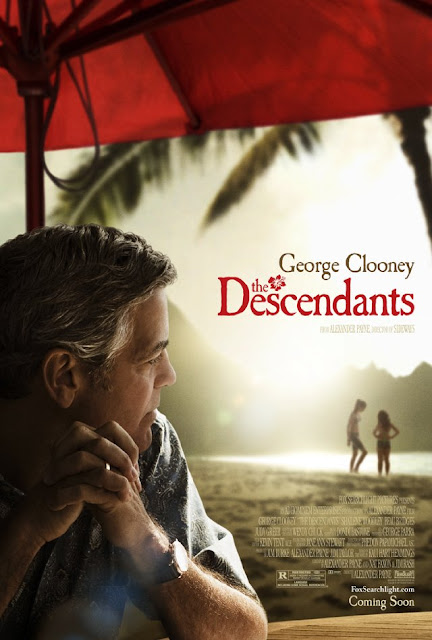Having never read Kaui Hart Hemmings' novel, I cannot speak to how well the original story incorporated the competing elements of the very human crisis the King family is facing – particularly reluctant patriarch Matt (Clooney) – with the larger scale, non-crisis that surprisingly draws more attention from those who interact with Peter and his daughters. Director Alexander Payne does not handle it very well, but he is saved by the restrained performances given by his veteran cast – Nick Krause doesn't quite find the tone for his character, and for that I do blame Payne. Then again, Payne directed for a movie I hated – Election (1999) – and one I found to be wholly overloved – Sideways (2004) – which was somewhat redeemed by the cast. Payne, from my limited exposure to his work, seems to not like people; he tears them down while trying to give a glimpse of their humanity. That bleeds through a little in The Descendants, but it doesn't derail the story or ruin the experience. Instead, Payne finds a way to use this conflict to keep the story messy in a compelling and real way.
Clooney plays Matt King, a moderately wealthy lawyer who also happens to be descended from Hawaiian royalty. He has a very large extended family that seems to live in a comfortable sense of disarray – many cousins whose financial situations are less (or much less) desirable than Matt's – and an immediate family from whom he has managed to emotionally divorce himself. When the audience is introduced to Matt, he is lamenting that latter situation via the voice over. I tend to despise the voice over. I view it, generally, as a failure of the director to find a way to express the same information through the actual scenes. It works in The Descendants, as it feels like Matt has a running journal with himself, a type of self-therapy to keep it all together. Payne keeps the voice overs coming for the first third of the film, but then they pretty much go away (leaving me again convinced that the director was convinced he couldn't find another way to convey the same information). Clooney does a good job with the character, veering into Doug Ross only once or twice (if he borrowed from other roles he has played, I didn't catch it) to find a level of intensity that didn't otherwise seem to fit Peter. This is where Clooney – no matter how good looking he is – can convince the audience that he is just an Everyman (albeit, his Everyman is of royal blood, a highly educated professional, and may trade his inheritance for an insane amount of money). He and Payne find a way for Matt to have a managed collapse of his life while he is pulling himself together, an incredible feat to show on film.
 |
| Matt (Clooney) and Alexandra (Woodley) driving around, looking for information and being baffled at why the Sid character doesn't quite fit into the story. |
There are moments of comic levity, but The Descendants never threatens to be a comedy. At the same time it is never treading in the emotional deep end. Like the character of Matt, the presentation is both reserved and confused (in a good way), breaking through every now and then when the emotional truth needs to win out. It is a daring style that Payne adopts here, but he does it in such a way that – while it limits the amount of emotional investment one has for the characters – makes the audience very aware of just how universally human the central concepts are.
The events in the movie feel a little too compressed. To have both events unfolding on top of each other fees like a contrivance, one that probably feels more natural in written form. There is no central message in The Descendants – it is willing to let its points be lost at times and contradicted, just like Matt as he has to sort through his feelings over his responsibility to his family and the larger family's legacy. I think that this is a good film, and it has at its heart a very good story. I expect Clooney to get an Academy Award nomination for his performance here. To be fair, it is far better than the one that won him an award in Syriana (2005).
I am glad I saw the movie, and would recommend it to others. It is not as good as some of the other film's I've seen on my mother's dime – like The King's Speech (2010) – but decidedly better than others – Morning Glory (2010). It is the best Alexander Payne movie I've seen to date, but I would sooner read the novel than give his other films a chance. I would guess the strengths are the story and the cast, with Payne managing this one the best he could.

No comments:
Post a Comment